After several intense final matches, the 4th FIDE Intercontinental Online Chess Championship for Prisoners successfully concluded, crowning champions in the Open, Women, and Youth categories. The victors were the United Arab Emirates in the Open section, Mongolia in the Women’s section, and India 1 in the Youth section. Let’s take a closer look at the paths these winners took to secure their titles.
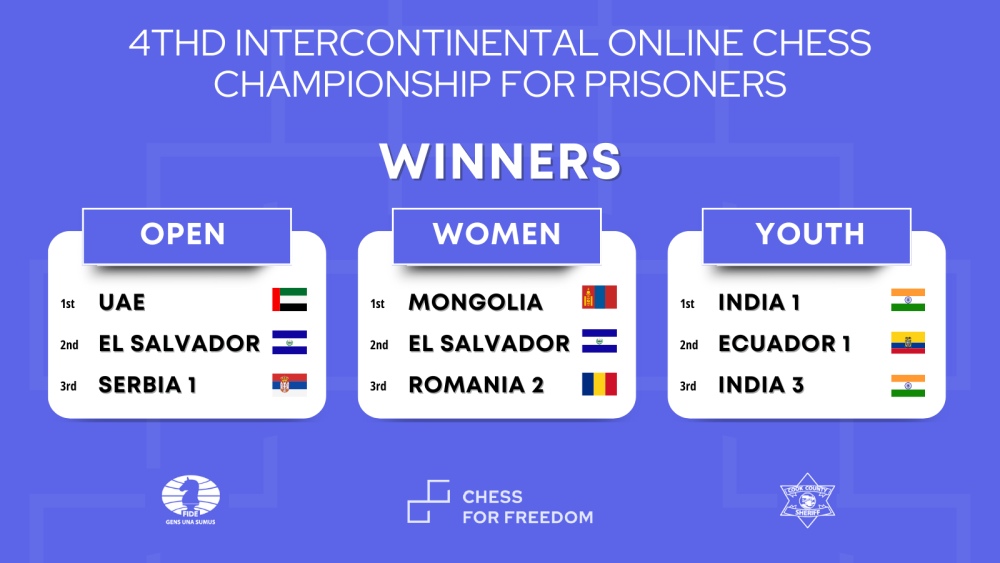
OPEN SECTION
On the first day of the tournament, the 115 teams were divided into groups according to their time zones, playing in a round-robin format in each section. The top two teams from each group advanced to the quarter-finals.
With the Open Section featuring a total of 10 groups in the first stage, the quarter-final and semi-final stages were merged. The qualified teams were divided into two groups of ten, with the winners, the United Arab Emirates and El Salvador 1, advancing to the final. The runner-ups, India 1 and Serbia 1, competed for third place.
Group 1
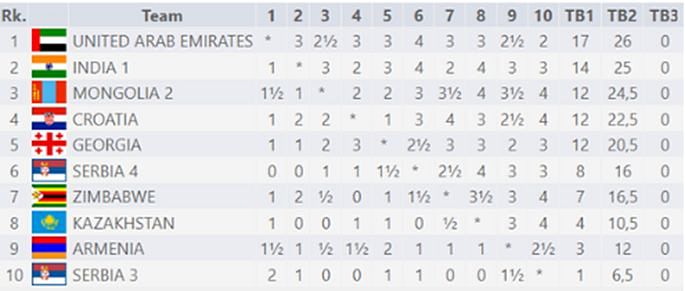
Group 2
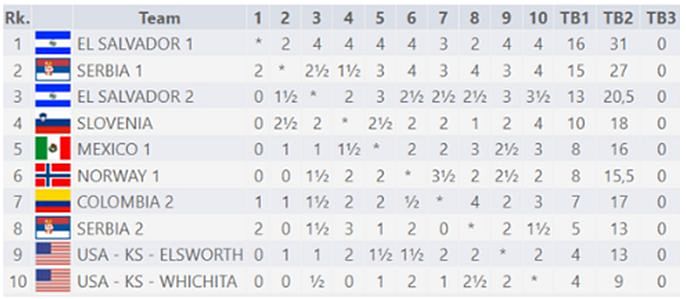
In the battle for bronze, Serbia defeated India in a two-round match. Serbia secured a narrow 2.5-1.5 victory in the first round and followed it up with a commanding 3.5-0.5 win in the second.
The final between El Salvador and the United Arab Emirates was packed with drama, ending in an Armageddon game. El Salvador won the first round with a sweeping 3.5-0.5 score, leaving them needing only a 2-2 draw to claim the title. However, the UAE responded strongly, winning the second round 2.5-1.5, pushing the match into a two-set play-off with a 3+2 time control. Once again, El Salvador took an early lead with a 3-1 score, but the UAE bounced back with a 2.5-1.5 win, forcing the contest into another blitz play-off.
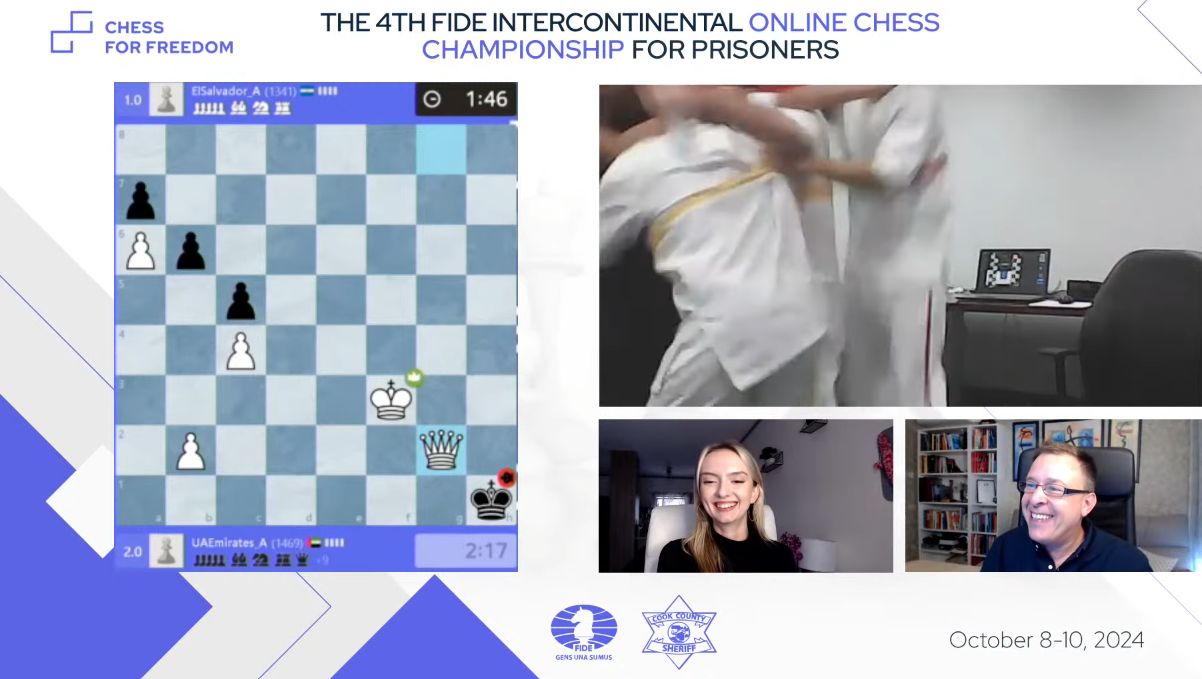
With the second phase of the blitz play-offs ending in a tie, the match culminated in an Armageddon game. Playing with the black pieces, the El Salvador player only needed a draw to secure the victory and held an advantage for most of the game. However, after some poor endgame decisions by El Salvador player, his UAE opponent seized the opportunity and scored a crucial victory securing the title for UAE.
Open Finals Round 1
El Salvador 1 3.5-0.5 United Arab Emirates
Open Finals Round 2
United Arab Emirates 2.5-1.5 El Salvador 1
Open Play-off Round 1
El Salvador 1 3-1 United Arab Emirates
Open Play-off Round 2
United Arab Emirates 2.5-1.5 El Salvador 1
Armageddon
United Arab Emirates 1-0 El Salvador 1
WOMEN SECTION
In the Women’s section, eight teams advanced to the quarter-finals, where they played double-round matches. The results were as follows:
Women Quarter-Finals Round 1
Mongolia 4-0 Latvia
El Salvador 4-0 Mexico
Romania 3-1 Georgia
Serbia 2-2 India 1
Women Quarter-Finals Round 2
Latvia 0-4 Mongolia
Mexico 1-3 El Salvador
Georgia 0-4 Romania
India 1 3.5-0.5 Serbia
Apart from the first-round match-up of Serbia and India, the top 4 teams mostly dominated their matches and cruised to the semi-finals.
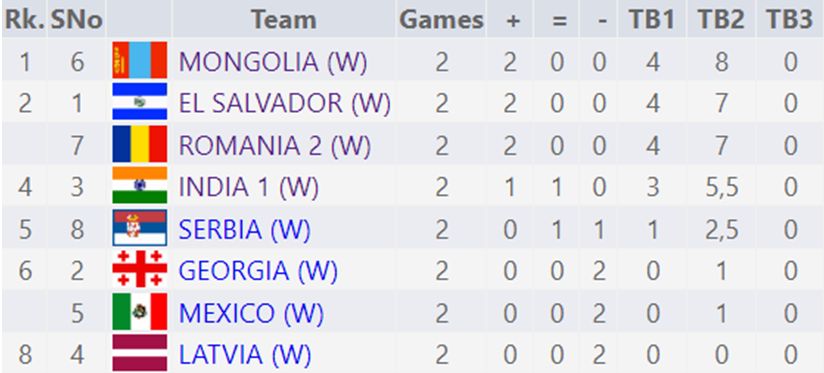
The semi-finals saw the four dominant teams battling for spots in the final. El Salvador swept India 4-0 in the first round, followed by a 2-2 draw, sending them to the finals. Mongolia overcame Romania with a narrow 2.5-1.5 win in the first game, followed by another 2-2 draw to secure their spot in the final.
Women Semi-Finals Round 1
El Salvador 4-0 India
Romania 1.5-2.5 Mongolia
Women Semi-Finals Round 2
India 2-2 El Salvador
Mongolia 2-2 Romania
In the finals, Mongolia and El Salvador were evenly matched, drawing the first round 2-2. However, Mongolia, the defending champions, dominated the second round with a 3-1 win to retain their title. Romania defeated India in a small final to claim bronze.
Women Finals Round 1
Mongolia 1 2-2 El Salvador
Women Finals Round 2
El Salvador 1-3 Mongolia
YOUTH SECTION
The Youth section, featuring players mostly aged 14-18, moved at a fast pace. Eight teams advanced to the quarter-finals, with both Indian teams, Serbia, and Ecuador making it through to the semi-finals.
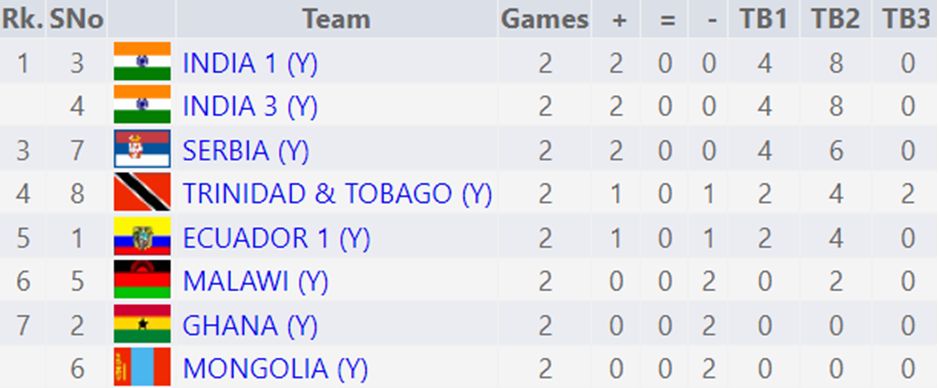
India 1 and India 3 faced off in a thrilling semi-final, with India 3 winning the first round 3-1. India 1 responded with a 3-1 win in the second round, leading to blitz play-offs, where India 1 dominated with scores of 3.5-0.5 and 4-0, advancing to the finals.
The Serbia-Ecuador semi-final also came down to blitz play-offs. Ecuador narrowly won the first round 2.5-1.5, but Serbia fought back with a 3-1 win in the second round. After a 2-2 draw in the first blitz play-off, Ecuador crushed Serbia 4-0 in the second one to reach the finals.
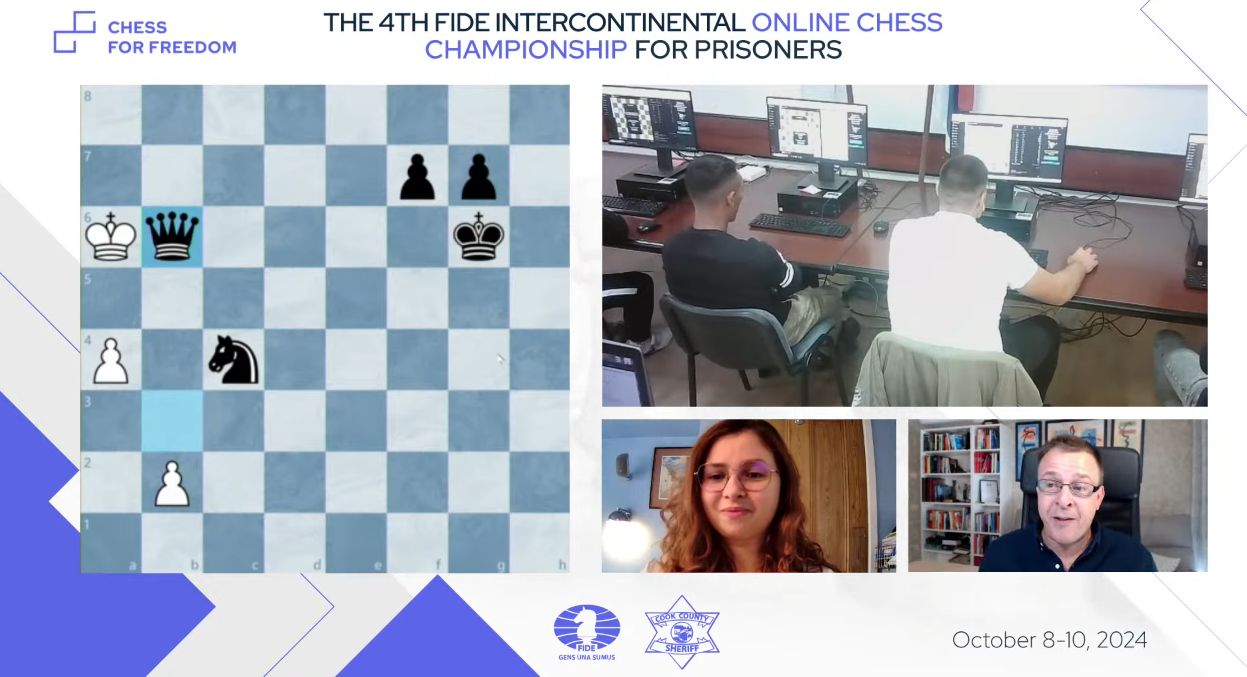
Youth Semi-Finals Round 1
India 1 1-3 India 3
Serbia 1.5-2.5 Ecuador
Youth Semi-Finals Round 2
India 3 1-3 India 1
Ecuador 1-3 Serbia
Youth Semi-Finals Play-off Round 1
India 1 3.5-0.5 India 3
Serbia 2-2 Ecuador
Youth Semi-Finals Play-off Round 2
India 3 0-4 India 1
Ecuador 4-0 Serbia
In the battle for third place, India 3 dominated Serbia, winning both rounds with a perfect score of 4-0. The final between India 1 and Ecuador started with a 2-2 draw in the first round, but India 1 turned in a commanding performance in the second round, clinching the title with a 3.5-0.5 victory.
Youth Finals Round 1
India 1 2-2 Ecuador
Youth Finals Round 2
Ecuador 0.5-3.5 India 1
The 4th FIDE Intercontinental Online Chess Championship for Prisoners showcased the transformative power of chess, bringing together players from across the globe in a thrilling display of skill, determination, and resilience. The event not only crowned champions from the United Arab Emirates, Mongolia, and India 1 in their respective categories but also highlighted the unifying spirit of the game, transcending borders and circumstances.
One of the guests on the broadcast, Dainis Mikelsons, a former inmate and participant of the 3rd FIDE Intercontinental Online Chess Championship for Prisoners, shared an emotional and personal account when asked about his experience:
“I love chess, and I have played it for all my life, and it has helped me during my life in very different and difficult situations. The emotions and feelings I had as a player when I was an inmate was something very, very different from a common day in prison.
There is a lot of empty noise in prison, but when you play chess, when I participated in the third championship, there was pleasant silence. [With this] pleasant silence while playing chess, [there is also] a storm raging because of emotions and feelings, and these feelings and emotions range from anger and disappointment to joy and happiness.”
With every move, these players demonstrated that chess is not just a game but a tool for rehabilitation, personal growth, and international solidarity. The fierce competition, culminating in dramatic play-offs, served as a testament to the determination of each team to overcome challenges, both on and off the board.

